Researchers led by Isabel Gordo have captured, in real-time, the occurrence of spurts of diversity in the microbiota, which is induced by bacterial cells that have mutation rates analogous to cancer cells.

Image Credit: Instituto Gulbenkian de Ciência.
The diverse nature of bacteria occurring in the human gut is a crucial biomarker of health, having an impact on multiple diseases, such as inflammatory bowel diseases and obesity, and influences a number of treatments. It is still not clear how such a diversity is maintained.
Researchers have found that bacteria have the ability to mutate and grow in the intestines of a person quicker than previously considered.
However, currently, researchers from the Instituto Gulbenkian de Ciência have discovered that cells of specific bacteria can grow and mutate a thousand times higher than usual—known as mutators—thereby causing spurts of diversity at remarkable rates.
The researchers used laboratory mice and focused on a gut bacteria that grows in all humans to demonstrate that ruby was found amid a sea of rubbish, caused by various mutations that affected the potential of the mutators.
The ruby denoted by the researchers was a useful mutation that increased the potential of the bacteria to consume a particular sugar in the gut and is responsible for the spurt of diversity that was noticed.
The study outcomes help explain the unique nature of the microbiome that exists inside each person and the changes noted following certain therapies. As a next step, the researchers intend to look for means to modulate the effects of mutations through chemical compounds or diet plans.
Source:
Journal reference:
Ramiro, R. S., et al. (2020) Low mutational load and high mutation rate variation in gut commensal bacteria. PLOS Biology. doi.org/10.1371/journal.pbio.3000617.